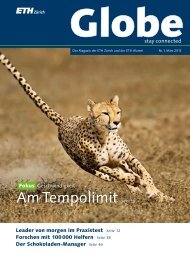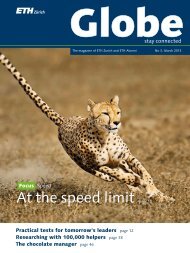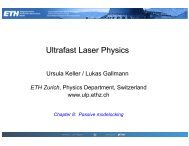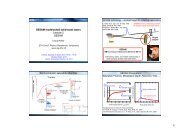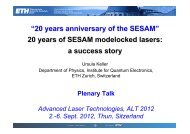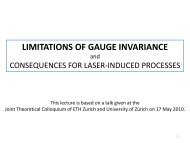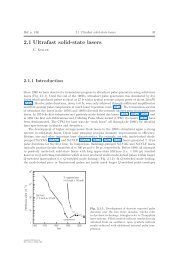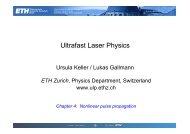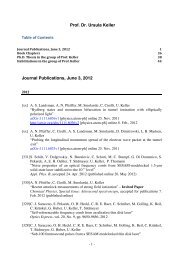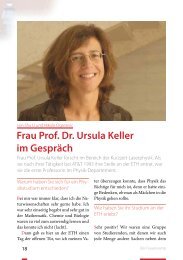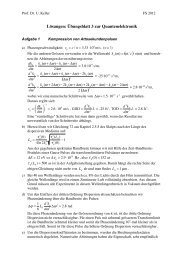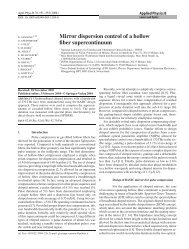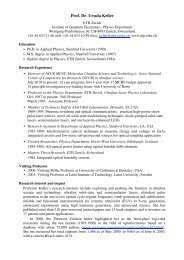Acceptance speech 24May11final
Acceptance speech 24May11final
Acceptance speech 24May11final
Create successful ePaper yourself
Turn your PDF publications into a flip-book with our unique Google optimized e-Paper software.
2011 Prize for Applied Aspects of Quantum Electronics and Optics:<br />
Ursula Keller<br />
The 2011 Prize for Applied Aspects of Quantum Electronics and Optics<br />
is awarded to Professor Ursula Keller, Professor in the Physics<br />
Department, ETH Zurich, Switzerland. The Prize is awarded to Professor<br />
Keller for “seminal contributions to ultrafast solid-state lasers,<br />
telecommunications, metrology, and attosecond science”.<br />
http://qeod.epsdivisions.org/qeod-prizes<br />
<strong>Acceptance</strong> <strong>speech</strong> May 24th:<br />
Ursula Keller<br />
“I am absolutely delighted to accept this award and would like to thank<br />
everyone throughout my career who contributed to me reaching this<br />
point, especially ETH Zurich and all the talented PhD students and<br />
postdocs who have worked with me. Also of course I would like to thank<br />
the selection committee, the people who took the time to make the<br />
nomination and write the supporting letters.<br />
Receiving this particular award means a lot to me, because this one<br />
recognizes both applied and fundamental contributions to science.<br />
Throughout my career I have always combined an interest in both of<br />
them, with the idea of developing technology to expand our knowledge<br />
horizon and make an impact in industry and our lives.<br />
As a Swiss national I first established my scientific career in applied<br />
science in the US. Having studied and worked at such great places as<br />
Stanford University and Bell Labs, I was fortunate to interact with<br />
outstanding teachers and mentors who gave me much good advice,<br />
assistance and also showed me how you can succeed in science.<br />
For example, Dave Auston a pioneer in THz spectroscopy made it<br />
possible for me to spend one summer at Bell Labs as a visiting student<br />
even though I was not officially eligible for this program, as a foreigner.<br />
When I recently asked Dave Auston at his 70 th birthday party why he did<br />
this for me – he told me he saw the “spark in my eyes” and also did not<br />
accept the rule, because after all as a Canadian he was also a foreigner in<br />
the US.
In my experience excellent and inspiring scientists try to support good<br />
upcoming people, even if they are a bit outspoken, do not necessarily fit<br />
into the system, or are minorities or are outsiders. It has made me realize<br />
that it is in the interest of science that we all do this.<br />
But it is also the types of challenges you are faced with, and how you<br />
deal with them, that make you develop in science. I started to work at<br />
Bell Labs as an independent staff scientist directly after my Ph.D.<br />
• My guidelines for building up my labs was simply “Do something<br />
different from everybody else, but it better be good.”<br />
• Then, when I went to my boss for advice on some ideas, he said<br />
“Why are you asking me? – you are the expert!”<br />
• When I was ready to spend my funds for building up my lab, he<br />
asked, “Are you sure you want to buy this laser? You only get this<br />
chance for such a large investment once!”<br />
… this was scary – after all when are you actually ever really sure?<br />
So I had to simply take a leap of faith, and make the important decisions<br />
independently. It was during this time at Bell Labs that I did the original<br />
work on the SESAM – but of course I did not know this would be the<br />
outcome at the beginning. You simply have to start and constantly ask<br />
the right questions, constantly challenge your chosen approach, readjust<br />
as needed. And it helps to be surrounded by excellent people for further<br />
stimulation, and to deal with their hard questions!<br />
My next step was to be invited back to Europe as a tenured Professor at<br />
ETH Zurich in 1993 – nearly 20 years ago. I was only 33 years old and<br />
one of the youngest profs and in addition the first female tenured<br />
professor in physics or in any other mathematical science or engineering<br />
area at ETH Zurich. This resulted in a culture shock both for me, and my<br />
colleagues in the Physics Department at ETH Zurich. It turned out to be<br />
very challenging, but at the same time at ETH Zurich I was empowered<br />
to do my independent research. I also had wonderful support from senior<br />
leaders in Europe such as Günter Huber, Orazio Svelto, David Hanna and<br />
Gerd Leuchs. Thank you for all your support over the years.<br />
Then ten years ago I added to my research a fundamental science field<br />
with attosecond science. This also meant I moved into another<br />
community in atomic and molecular science. You feel like a new young<br />
postdoc and also get treated as such … (overall probably a good<br />
experience …). But very often it is the move into some related, but still<br />
different field, which helps to make innovative contributions because<br />
“you think differently.” You did not go through the same training as most
of the well-established members in that community. But you also pay a<br />
price – you feel very stupid many times because initially you do not<br />
understand or know the obvious … But the attoclock was one outcome of<br />
this move! I am truly grateful to Anne L’Huillier who accepted me for a<br />
sabbatical in Lund in 2001 and she has been an inspiration in this work.<br />
So I would like to end by asking: Why are we doing this, pursuing<br />
scientific research? It is because we humans have so many challenges<br />
ahead of us, and in my view we will certainly need strong science and<br />
technology – both in fundamental and applied science, to be successful<br />
(both in the short term and in the long term). We need to all support good<br />
scientific work and we need to encourage our young collaborators, who<br />
after all do the experiments and dedicate long hours to lab work in order<br />
to achieve results.<br />
The scientific community is one community that can set a leading<br />
example as to how we can interact beyond borders, gender and race. I<br />
believe this is important and essential for our future.<br />
Thank you once again for the support that has enabled me to stand here<br />
and receive this prize. Thank you – and thank you Kurt for having been<br />
such a great husband for more than 20 years.”



